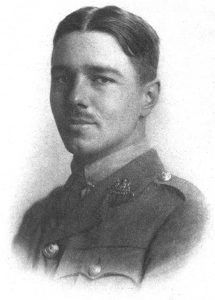At school I studied poetry as part of the English Literature course. Having to analyse, criticise and deconstruct poems can drain the joy from reading them. Despite this handicap, there is one poem that sticks in my mind from that time.
I read avidly, and have done so from an early age. My local library when I was a teenager (Aldershot, Hampshire) was full of books on general military history, particular events and the people involved. I was fascinated by stories of the significant actions and people from the past. “Reach for the Sky”, “The Dambusters”, “Cheshire VC”, “The Longest Day”, “Carve Her Name with Pride”, “The Great Escape” are just some of the books that I read. I was, in a sense, “ardent for some desperate glory”.
 The poem that changed my view was, of course, “Dulce et Decorum Est” by Wilfred Owen. It had a powerful impact on me. It still has the power to move. He brings alive the suffering of war at a personal level. It is clear that he wrote from personal experience. Many years later, I discovered a personal connection. I will cover that in another blog.
The poem that changed my view was, of course, “Dulce et Decorum Est” by Wilfred Owen. It had a powerful impact on me. It still has the power to move. He brings alive the suffering of war at a personal level. It is clear that he wrote from personal experience. Many years later, I discovered a personal connection. I will cover that in another blog.
DULCE ET DECORUM EST by WILFRED OWEN
Bent double, like old beggars under sacks,
Knock-kneed, coughing like hags, we cursed through sludge,
Till on the haunting flares we turned our backs
And towards our distant rest began to trudge.
Men marched asleep. Many had lost their boots
But limped on, blood-shod. All went lame; all blind;
Drunk with fatigue; deaf even to the hoots
Of tired, outstripped Five-Nines that dropped behind.
Gas! Gas! Quick, boys!—An ecstasy of fumbling,
Fitting the clumsy helmets just in time;
But someone still was yelling out and stumbling,
And flound’ring like a man in fire or lime…
Dim, through the misty panes and thick green light,
As under a green sea, I saw him drowning.
In all my dreams, before my helpless sight,
He plunges at me, guttering, choking, drowning.
If in some smothering dreams you too could pace
Behind the wagon that we flung him in,
And watch the white eyes writhing in his face,
His hanging face, like a devil’s sick of sin;
If you could hear, at every jolt, the blood
Come gargling from the froth-corrupted lungs,
Obscene as cancer, bitter as the cud
Of vile, incurable sores on innocent tongues,—
My friend, you would not tell with such high zest
To children ardent for some desperate glory,
The old Lie: Dulce et decorum est
Pro patria mori.
“Dulce et Decorum Est,” by Owen, Wilfred (1893-1918). The Estate of Wilfred Owen. The Complete Poems and Fragments of Wilfred Owen edited by Jon Stallworthy first published by Chatto & Windus, 1983. Preliminaries, introductory, editorial matter, manuscripts and fragments omitted. via First World War Poetry Digital Archive, accessed October 31, 2019, http://ww1lit.nsms.ox.ac.uk/ww1lit/collections/item/3303.
